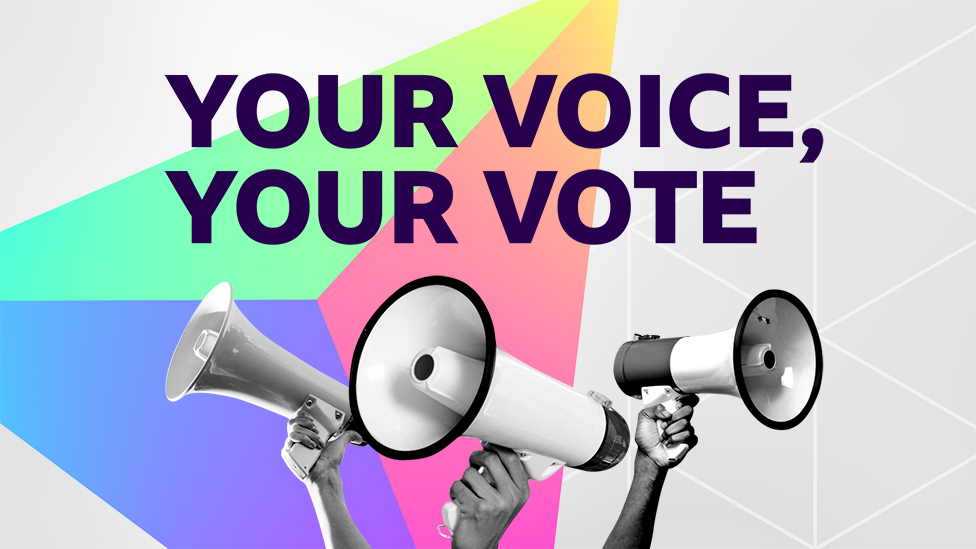'I'm forced to choose love or disability benefit'

Rose Kindred said the system forced disabled people "to choose between the security of living and love"
- Published
A woman with a chronic pain condition has said she is being forced to choose between love and affording to live due to benefit restrictions.
Rose Kindred, from Ipswich, lives with hypermobile Ehlers-Danlos Syndrome (EDS) and wants to move in with her partner, but current benefits rules mean her payments would be slashed, making it unaffordable for them both.
She got in touch with the BBC via Your Voice, Your Vote, concerned about the way disabled people were treated within the benefits system.
"I think it’s a cruel system that forces disabled people to choose between the security of living and love," she said.
Ms Kindred, 26, has been declared unfit for work by the Department for Work and Pensions (DWP) because of her condition, which causes the body's collagen to mutate on a genetic level, leaving her with joint hypermobility and poor balance and co-ordination.
She receives a £405.40 Personal Independence Payment (PIP) per month and £809.64 in universal credit every four weeks.
Ms Kindred said she found it "nonsensical" that her parents' income was not considered but if she moved in with her partner, who earns about £30,000 a year, a government benefits calculator suggested she would lose her universal credit payments.

Rose Kindred says she would like to move in with her partner Denis Gibbons
"I’d like to move in with my partner of five years but unfortunately we can’t because of the living-as-if-married clause from the Department for Work and Pensions.
"That’s £405 a month to live on entirely, that's before I pay for a private physio, which makes up for what the NHS can’t provide for me."
“I’m basically stuck living with my parents because that’s the only option available to me."
Ms Kindred also raised concerns about proposed changes to PIP by the Conservatives that would see changes to the way payments are made.
The charity Ehlers-Danlos Support UK said it had concerns about proposed changes to PIP.
In a statement, it said: "EDS is misunderstood and diagnosis can take decades. This makes it hard to evidence the daily struggle of living with this illness.
"We are concerned by the proposed changes to PIP and reached out to our members to better understand their experiences.
"We have encouraged them to respond to the consultation.
"Our Adviceline has also seen a significant rise in members asking for help with benefits which is indicative of the growing problems people with EDS face in the UK."

What the parties say
The Liberal Democrats say they will give disabled people and organisations representing them a stronger voice in the design of benefits policies and processes. They will bring work capability assessments in-house, reform PIP assessments to make the process more transparent and stop unnecessary reassessments, and end the use of informal assessments.
The Greens say they will restore the value of disability benefits, with an immediate uplift of 5%. They will reform intrusive eligibility tests like PIP and the unfair targeting of carers and disabled people on benefits. And in the long term, introduce a universal basic income to give everybody the security to start a business, study, train and live their life in dignity.
Labour want to work with local areas to create plans to support more disabled people and those with health conditions into work. They will devolve funding so local areas can shape a joined-up work, health, and skills offer for local people. While they pledge to tackle a backlog of Access to Work claims, they do not say anything about benefits such as PIP.
Reform UK says says PIP and work capability assessments should be face-to-face. They will require independent medical assessments to prove eligibility for payments. Those registered with severe disabilities or serious long-term illnesses would be exempt from regular checks.
The Conservatives say they will reform benefits to stop a projected rise in PIP payouts. But the manifesto does not give details of changes beyond pledging a “more objective” assessment of an individual's needs. They say they will make the assessment process simpler and fairer for those with the most severe conditions.

What really matters to you in this general election? What is the one issue that will influence your vote? Click the button below to submit your idea, and it could be featured on the BBC.